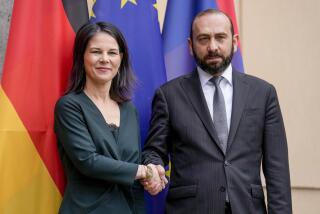Honecker Visit Called a Limited Success
- Share via
BONN — As East German leader Erich Honecker toured the industrial Ruhr Valley on Wednesday, both West and East German political observers pronounced the first two days of the landmark visit a limited success.
That Honecker is the first East German leader to visit West Germany was seen as a plus, as is the fact that neither he nor West German Chancellor Helmut Kohl papered over the two Germanys’ deep political differences.
“The lively exchange of table speeches was more important than arranged communiques,” commented the influential, conservative newspaper Frankfurter Allgemeine. “There were more sparks flying than anybody expected.”
The paper praised Kohl for forthrightly criticizing the orders of East German border guards to shoot those heading west. But it also suggested that Honecker refreshingly pointed out that socialism and capitalism mixed no more easily than fire and water.
Similarly, the Frankfurter Rundschau declared that the meeting indicated that leaders from East and West Germany “can talk without giving up basic patterns” and that the two governments “will try to find the best possible means for a special relationship with each other.”
And U.S. Ambassador Richard R. Burt declared on a television program that “Honecker’s visit is a symbol of gradual rapprochement between the two German states.”
Several commentators suggested that now that Honecker has publicly agreed to ease travel restrictions on East Germans who want to visit relatives in West Germany, he would have to deliver on his promises or be seen to be breaking his word.
Thus, the main goal in the Bonn government’s invitation to Honecker--to soften the Communist state’s burden on East Germans--would seem to have been successful, to the degree that Honecker was personally and publicly informed about that concern.
For his part, Honecker was treated as a head of state--even though the visit was officially described as a “working” one--and was surrounded by the two red-gold-and-black German flags, almost identical except for the East’s hammer, compass and wheat sheaf.
The VIP treatment accorded Honecker, and the vast coverage by the German media, served to emphasize on both sides of the 863-mile border wall that East Germany is indeed a permanent state, and not just a temporary Communist regime established by the Soviets after World War II.
Honecker also took the opportunity to dispel any notions that unification of the two Germanys was in the cards, describing any such speculation as “fireside dreams.”
Unusually, East Germans were treated to uncensored accounts of the meetings between the two leaders with the main Communist newspaper, Neues Deutschland, carrying remarks by Kohl condemning the Berlin Wall and reaffirming the goal of German reunification, as contained in the federal republic’s constitution. The paper also carried an account of Kohl’s call for an end to the shooting of East Germans trying to cross the border.
And East German television broadcast live coverage of Kohl’s and Honecker’s speeches, none of them uncensored or edited.
During Honecker’s Wednesday visit to the Rhine and Ruhr valley cities, he was reminded of the sometimes shoddy quality of East German goods by those industrialists to whom the Communist regime would like to export products.
West German businessmen in Cologne urged Honecker to cut the bureaucratic red tape for increased trade and to improve the quality of East German exports.
Upgrading of Products
This was the no-nonsense, non-ideological talk of businessmen, and it may have served to alert Honecker to upgrade the products he wishes to sell to the West.
Honecker was escorted through the Ruhr by North Rhine-Westphalia state Premier Johannes Rau, the unsuccessful Social Democratic party candidate for chancellor in the last national election in January, and among the stops was a visit to the house of Friedrich Engels, one of communism’s founding fathers.
On emerging, Honecker was startled as dozens of photographers surrounded him when rock star Udo Lindenberg approached him to make a statement. The two chatted briefly, and Lindenberg, who regularly sings a number of humorous and irreverent songs about Honecker, presented the East German with his guitar.
At the end of his day, Honecker flew to the Saarland where the 75-year-old leader today will visit his home town of Wiebelskirchen, now incorporated into the larger community of Neunkirchen, which he left as a young Communist to spend 10 years in Nazi prisons.
Halfway through the Honecker tour, the diplomatic talks with West German federal officials having been concluded, East German spokesman Wolfgang Meyer summed up the visit succinctly:
“Beyond all that divides us, there is a dominating will to work together.”
More to Read
Sign up for Essential California
The most important California stories and recommendations in your inbox every morning.
You may occasionally receive promotional content from the Los Angeles Times.













